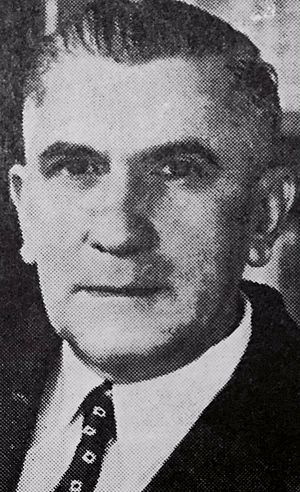Manuel Felipe Rugeles facts for kids
Manuel Felipe Rugeles was a Venezuelan poet, journalist, and politician. He was born in San Cristóbal, Venezuela in 1903 and passed away in Caracas in 1959. As a poet, he was part of a special group of writers known as the Generation of 1918. He became famous for his beautiful poems and his work in children's literature.
Contents
Who Was Manuel Felipe Rugeles?
Manuel Felipe Rugeles began his life in the Andes region of Venezuela. From a young age, he showed a great talent for writing. He joined a group of writers who shared new ideas for poetry and literature. This group was called the Generation of 1918. They helped shape Venezuelan literature during their time.
A Voice for Change
Manuel Felipe Rugeles was not afraid to speak his mind. He often criticized the government leader at the time, General Juan Vicente Gomez. Because of his strong opinions, he faced difficulties. In 1929, he was put in prison in the San Carlos castle in Zulia. After his release, he had to leave Venezuela. He lived in Colombia for a while, away from his home country.
Returning Home and Public Service
In 1936, after the death of the former leader, Rugeles was able to return to Venezuela. He continued his work as a writer and journalist. He also took on important roles in public service. For example, he worked with the Venezuelan delegation in Washington in 1948. He also served as a cultural advisor in the Venezuelan Embassy in Buenos Aires.
Later, from 1953 to 1957, he directed the Department of Culture and Arts for the Ministry of Education. He also led the National Magazine of Culture. These roles allowed him to promote art and literature across Venezuela.
Writing for Young Readers
Manuel Felipe Rugeles had a special love for children's literature. In his later years, he created and managed a children's magazine called Pico-Pico. This magazine brought stories and poems to young readers. His book of poems, ¡Canta Piruelo!, is one of the most beloved books in Venezuelan children's literature. It is filled with joyful and imaginative verses. In recognition of his amazing work, he received the National Prize for Literature in 1955. This was a very important award for his contributions to Venezuelan writing.
See also
 In Spanish: Manuel Felipe Rugeles para niños
In Spanish: Manuel Felipe Rugeles para niños
 | Kyle Baker |
 | Joseph Yoakum |
 | Laura Wheeler Waring |
 | Henry Ossawa Tanner |


